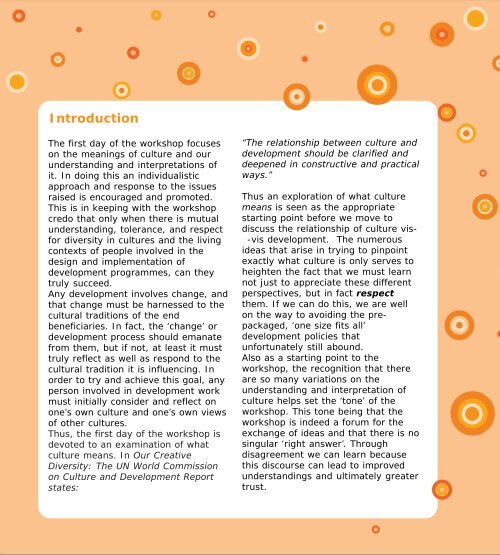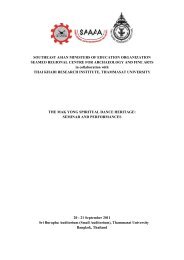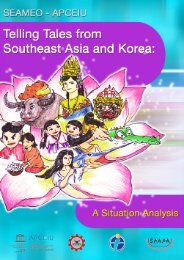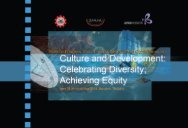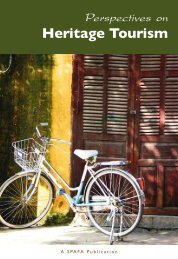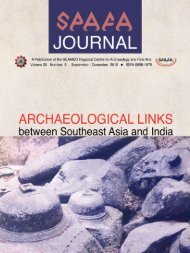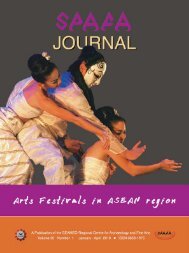on Culture & Development - Seameo-SPAFA
on Culture & Development - Seameo-SPAFA
on Culture & Development - Seameo-SPAFA
- No tags were found...
You also want an ePaper? Increase the reach of your titles
YUMPU automatically turns print PDFs into web optimized ePapers that Google loves.
34Introducti<strong>on</strong>The first day of the workshop focuses<strong>on</strong> the meanings of culture and ourunderstanding and interpretati<strong>on</strong>s ofit. In doing this an individualisticapproach and resp<strong>on</strong>se to the issuesraised is encouraged and promoted.This is in keeping with the workshopcredo that <strong>on</strong>ly when there is mutualunderstanding, tolerance, and respectfor diversity in cultures and the livingc<strong>on</strong>texts of people involved in thedesign and implementati<strong>on</strong> ofdevelopment programmes, can theytruly succeed.Any development involves change, andthat change must be harnessed to thecultural traditi<strong>on</strong>s of the endbeneficiaries. In fact, the ‘change’ ordevelopment process should emanatefrom them, but if not, at least it musttruly reflect as well as resp<strong>on</strong>d to thecultural traditi<strong>on</strong> it is influencing. Inorder to try and achieve this goal, anypers<strong>on</strong> involved in development workmust initially c<strong>on</strong>sider and reflect <strong>on</strong><strong>on</strong>e’s own culture and <strong>on</strong>e’s own viewsof other cultures.Thus, the first day of the workshop isdevoted to an examinati<strong>on</strong> of whatculture means. In Our CreativeDiversity: The UN World Commissi<strong>on</strong><strong>on</strong> <strong>Culture</strong> and <strong>Development</strong> Reportstates:“The relati<strong>on</strong>ship between culture anddevelopment should be clarified anddeepened in c<strong>on</strong>structive and practicalways.”Thus an explorati<strong>on</strong> of what culturemeans is seen as the appropriatestarting point before we move todiscuss the relati<strong>on</strong>ship of culture vis--vis development. The numerousideas that arise in trying to pinpointexactly what culture is <strong>on</strong>ly serves toheighten the fact that we must learnnot just to appreciate these differentperspectives, but in fact respectthem. If we can do this, we are well<strong>on</strong> the way to avoiding the prepackaged,‘<strong>on</strong>e size fits all’development policies thatunfortunately still abound.Also as a starting point to theworkshop, the recogniti<strong>on</strong> that thereare so many variati<strong>on</strong>s <strong>on</strong> theunderstanding and interpretati<strong>on</strong> ofculture helps set the ‘t<strong>on</strong>e’ of theworkshop. This t<strong>on</strong>e being that theworkshop is indeed a forum for theexchange of ideas and that there is nosingular ‘right answer’. Throughdisagreement we can learn becausethis discourse can lead to improvedunderstandings and ultimately greatertrust.


